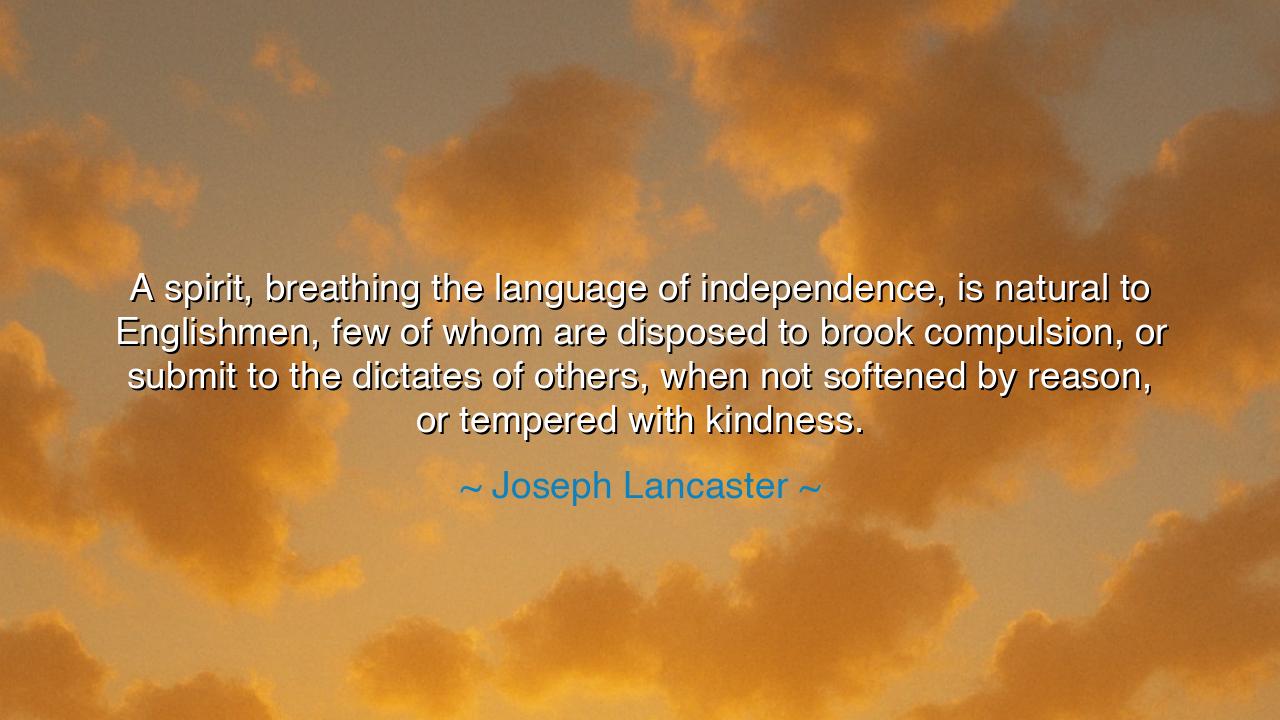
A spirit, breathing the language of independence, is natural to
A spirit, breathing the language of independence, is natural to Englishmen, few of whom are disposed to brook compulsion, or submit to the dictates of others, when not softened by reason, or tempered with kindness.






When Joseph Lancaster wrote, “A spirit, breathing the language of independence, is natural to Englishmen, few of whom are disposed to brook compulsion, or submit to the dictates of others, when not softened by reason, or tempered with kindness,” he was speaking not only of his countrymen, but of a universal quality of the free soul. His words reveal an enduring truth: that the desire for independence, the refusal to bow before tyranny or arbitrary command, is woven into the fabric of human dignity. Lancaster, an educator and reformer of the early nineteenth century, believed that education should cultivate this independence of spirit — that it should train minds not to obey blindly, but to reason, to question, and to stand upright before all authority save truth and conscience.
The origin of this quote lies in the writings of Joseph Lancaster (1778–1838), a visionary British Quaker who founded the Lancasterian system of education — a method designed to bring learning to the poor at a time when knowledge was still a privilege of the wealthy. His system emphasized moral instruction alongside intellectual growth, believing that freedom of thought was the foundation of moral character. When he spoke of the “spirit breathing the language of independence,” he was describing not rebellion, but self-governance — the sacred balance between liberty and discipline that marks the truly educated mind. For Lancaster, compulsion might yield obedience, but only reason and kindness could awaken the will to do what is right freely.
In these words, we can hear echoes of England’s long struggle for liberty — from Magna Carta to the English Bill of Rights. The “spirit of independence” Lancaster describes was the same force that had inspired generations to resist despots and demand representation. It was the fire that once led farmers to stand against kings, and thinkers to stand against dogma. Yet Lancaster understood that this independence, if untamed, could turn to pride or anarchy. Hence his warning: that authority must always be “softened by reason” and “tempered with kindness.” For freedom does not thrive in chaos; it lives where power is guided by wisdom and compassion.
Consider the story of William Penn, founder of Pennsylvania, another Englishman of conscience and a fellow Quaker like Lancaster. Penn refused to bow to coercion — imprisoned in the Tower of London for his faith, he remained steadfast in peace, proving that true independence is not defiance for its own sake, but obedience to a higher moral law. When he later founded his colony in the New World, he built it on tolerance, equality, and free worship — principles that would later inspire the ideals of democracy itself. Lancaster’s words reflect this same lineage of thought: that liberty is not granted by rulers, but discovered within the soul when reason rules over fear.
The ancient philosophers, too, would have understood Lancaster’s wisdom. Aristotle taught that the highest form of freedom is self-mastery; Seneca wrote that the wise man is “most free when he obeys reason.” Lancaster’s phrase “few of whom are disposed to brook compulsion” reminds us that the human spirit, when properly formed, resists being forced. True education, then, is not the molding of obedience, but the awakening of conscience. The whip may train the hand, but only understanding trains the heart. It is through reason and kindness, as Lancaster said, that men learn not merely to resist tyranny, but to rule themselves with justice.
Yet, Lancaster’s insight also carries a warning for every age. He reminds us that independence, though noble, can become arrogance if unbalanced by empathy. A people too proud to submit even to wise counsel are as lost as those who submit too easily to tyranny. The spirit of independence must therefore be bound to humility — to the understanding that freedom finds its highest expression not in defiance, but in harmony with truth. The Englishman of Lancaster’s time, confident yet civil, proud yet principled, embodied this ideal; but so too must every man and woman who calls themselves free.
So, my children of the mind and of the heart, remember this lesson: true independence is not rebellion but reason guided by compassion. Let no one rule your conscience, but let your conscience be ruled by wisdom. Resist compulsion when it comes from pride or cruelty, but submit gladly to what is just and kind. For freedom is not the absence of authority, but the presence of understanding. Let the spirit that Lancaster praised — the spirit that breathes the language of independence — dwell in you also, that you may walk upright in a world that still tests the courage of the free.






AAdministratorAdministrator
Welcome, honored guests. Please leave a comment, we will respond soon